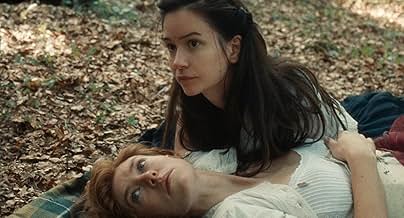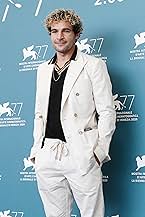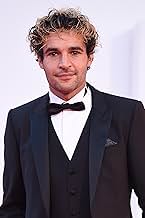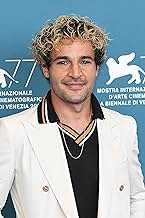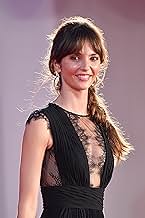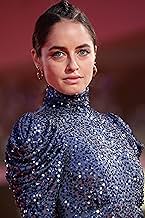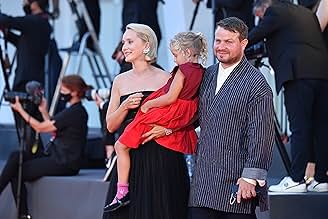Quelque part le long de la frontière de la côte est américaine du milieu du XIXe siècle, deux couples voisins se battent contre la misère et l'isolement, témoins d'un paysage splendide mais ... Tout lireQuelque part le long de la frontière de la côte est américaine du milieu du XIXe siècle, deux couples voisins se battent contre la misère et l'isolement, témoins d'un paysage splendide mais éprouvant.Quelque part le long de la frontière de la côte est américaine du milieu du XIXe siècle, deux couples voisins se battent contre la misère et l'isolement, témoins d'un paysage splendide mais éprouvant.
- Réalisation
- Scénario
- Casting principal
- Récompenses
- 5 victoires et 8 nominations au total
Karina Ziana Gherasim
- Nellie
- (as Karina Gherasim)
Ioachim Ciobanu
- Widow Weldon's Son
- (as Kim Ciobanu)
Sandra Personnic-House
- Mrs. Nottoway
- (as Sandra J House)
Avis à la une
Like all lesbian romance period pieces, it was about undeniable feelings that must be denied.
But something about it felt very deep and real. I didn't cry or feel much, but it made me think and wonder.
I really really loved the set and costumes. I couldn't find any trace that it was filmed in the 21st century.
But something about it felt very deep and real. I didn't cry or feel much, but it made me think and wonder.
I really really loved the set and costumes. I couldn't find any trace that it was filmed in the 21st century.
"When the day is done, my mind turns to her and I think, why are we to be separated"
Despite ( or because of) its obvious slowness I enjoyed The World To Come. It's feel and pace reminded me a lot of Portrait of a Lady on Fire and there are other obvious comparisons .
It's the story of two neighbouring couples who battle hardship and isolation, witnessed by a splendid yet testing landscape, challenging them both physically and psychologically.
This is a love story brought on be the harshness of the environment they live in and the relationships they are stuck in.
The two women are superbly played by Katherine Waterston and Vanessa Kirby and the moment they set eyes on each other you are totally convinced they are in love .
The cinematography is superb , especially when the storm is raging and the scenery is beautiful but surprisingly it's not filmed in America it's shot in Romania.
This won't be to everyone's taste but enjoyed they pace of it and I totally believed in the characters.
Not bad at all.
Despite ( or because of) its obvious slowness I enjoyed The World To Come. It's feel and pace reminded me a lot of Portrait of a Lady on Fire and there are other obvious comparisons .
It's the story of two neighbouring couples who battle hardship and isolation, witnessed by a splendid yet testing landscape, challenging them both physically and psychologically.
This is a love story brought on be the harshness of the environment they live in and the relationships they are stuck in.
The two women are superbly played by Katherine Waterston and Vanessa Kirby and the moment they set eyes on each other you are totally convinced they are in love .
The cinematography is superb , especially when the storm is raging and the scenery is beautiful but surprisingly it's not filmed in America it's shot in Romania.
This won't be to everyone's taste but enjoyed they pace of it and I totally believed in the characters.
Not bad at all.
Greetings again from the darkness. I'd be hard-pressed to name a movie that is more somber, front beginning to end, than this film from director Mona Fastvold (writer of VOX Lux, 2018) and co-writers Ron Hansen (THE ASSASSINATION OF JESSE JAMES BY THE COWARD ROBERT FORD, 2017) and Jim Shepard (based on his short story). Allowing only a few sparks of hope in the second act, the film's ending finds us nearly as beaten down as the four main characters we've just watched.
Structured as though Abigail (Katherine Waterston) is reading her own journal entries as they play out in real life, the film captures the brutal conditions of working a hillside farm in upstate New York during 1856. But more than that, it conveys the price of a joyless existence on the frontier, when days were spent adhering to chores. For everyone, this meant little social interaction; and for women this meant cooking, cleaning, and giving birth. Abigail mesmerizes with her balletic poetry in describing the drudgery of her life and marriage to Dyer (Casey Affleck). Dyer is a sullen man who says little, but remains dutiful in his responsibilities. He is attuned enough to allow Abigail her space after diphtheria claims their young daughter ... though he seems mostly unchanged by the tragedy.
Abigail's emptiness and unrequited quest for meaning seem her destiny until the day that new arrivals rent the next farm over. As Finney (Christopher Abbott) guides the wagon by, Abigail and Tallie (Vanessa Kirby) lock eyes, signaling to them (and us) that life on the frontier is about to become more exciting than collecting that day's eggs from the chicken coup. This moment arrives mere weeks after Abigail as narrator has informed us, "With little pride and less hope, we begin the new year." And just like that, she has hope.
The two women begin to spend days together building a connection first borne from isolation and loneliness, and soon growing into a true relationship. Dyer deals with his wife's affinity for the new girl with a nonchalance that masks his agitation. Finney, on the other hand, is a quietly simmering man of anger that wreaks of a violent nature just below the surface. These are combustible elements in a world where this type of relationship between women is simply not discussed or admitted.
We witness the beginning, middle, and end of the relationship between Abigail and Tallie. We see how each lights up around the other ... although Tallie's well-coiffed auburn hair always seems out of place in an environment where showers and shampoo would be scarce. It's really Abigail's narration and lyrical use of language that propels the story, and as lovely as her words are, the actual pacing of the film is a bit slow at times. Of course, that corresponds to the oppressive bleakness of this world, adding to the challenge for viewers.
The four lead performances are all terrific. The two men have less screen time and certainly less dialogue, but we never once doubt where they stand. Ms. Waterston has been a standout with her work over the past few years, and Ms. Kirby recently posted one of last year's finest performances in PIECES OF A WOMAN. She's clearly a star in the making. Composer Daniel Blumberg's work is a good fit, and cinematographer Andre Chemetoff works wonders with the muted color palette. Bucharest is the stand in for 19th century upstate New York, allowing us to see the harshness. Period lesbian romances are rare, though this is the third in a short period of time along with AMMONITE (2020) and PORTRAIT OF A LADY ON FIRE (2019). Just prepare yourself for an hour and a half of anguish. In theaters February 12th, 2021 and on digital March 2nd, 2021
Structured as though Abigail (Katherine Waterston) is reading her own journal entries as they play out in real life, the film captures the brutal conditions of working a hillside farm in upstate New York during 1856. But more than that, it conveys the price of a joyless existence on the frontier, when days were spent adhering to chores. For everyone, this meant little social interaction; and for women this meant cooking, cleaning, and giving birth. Abigail mesmerizes with her balletic poetry in describing the drudgery of her life and marriage to Dyer (Casey Affleck). Dyer is a sullen man who says little, but remains dutiful in his responsibilities. He is attuned enough to allow Abigail her space after diphtheria claims their young daughter ... though he seems mostly unchanged by the tragedy.
Abigail's emptiness and unrequited quest for meaning seem her destiny until the day that new arrivals rent the next farm over. As Finney (Christopher Abbott) guides the wagon by, Abigail and Tallie (Vanessa Kirby) lock eyes, signaling to them (and us) that life on the frontier is about to become more exciting than collecting that day's eggs from the chicken coup. This moment arrives mere weeks after Abigail as narrator has informed us, "With little pride and less hope, we begin the new year." And just like that, she has hope.
The two women begin to spend days together building a connection first borne from isolation and loneliness, and soon growing into a true relationship. Dyer deals with his wife's affinity for the new girl with a nonchalance that masks his agitation. Finney, on the other hand, is a quietly simmering man of anger that wreaks of a violent nature just below the surface. These are combustible elements in a world where this type of relationship between women is simply not discussed or admitted.
We witness the beginning, middle, and end of the relationship between Abigail and Tallie. We see how each lights up around the other ... although Tallie's well-coiffed auburn hair always seems out of place in an environment where showers and shampoo would be scarce. It's really Abigail's narration and lyrical use of language that propels the story, and as lovely as her words are, the actual pacing of the film is a bit slow at times. Of course, that corresponds to the oppressive bleakness of this world, adding to the challenge for viewers.
The four lead performances are all terrific. The two men have less screen time and certainly less dialogue, but we never once doubt where they stand. Ms. Waterston has been a standout with her work over the past few years, and Ms. Kirby recently posted one of last year's finest performances in PIECES OF A WOMAN. She's clearly a star in the making. Composer Daniel Blumberg's work is a good fit, and cinematographer Andre Chemetoff works wonders with the muted color palette. Bucharest is the stand in for 19th century upstate New York, allowing us to see the harshness. Period lesbian romances are rare, though this is the third in a short period of time along with AMMONITE (2020) and PORTRAIT OF A LADY ON FIRE (2019). Just prepare yourself for an hour and a half of anguish. In theaters February 12th, 2021 and on digital March 2nd, 2021
Obviously the best of the movie are the performances, that made the movie interesting,. Kirby is just amazing and real, and waterstone is delivering a really good performance.. Both made that the story get more interesting, and felt connected.
Movie has made in Rumania in a mountain where the entire cast was isolated, so the movie is as well isolated, with 2 amazing performances.
If We compare with ammonites for example, I think that has note been well directes, there is a lack of details, so is one of the reasons why movie Doesn't have punch.. It's whorty just for watch the performances of kirby that is the actress of the Future, a beast of acting, and Waterston that from the inmaculate actress that seems appears at almost the same level than Kirby
The World To Come: Life was bleak and hard in 1856 in Upstate New York, rocky fields, sheep, (could be Connemara), chickens. Life was lonely for women, but here a relationship develops between two women which goes beyond friendship. Tragedy results but the unfolding of the narrative is moving. A tale of love, separation, hardship, patriarchy and it's discontents. Directed by Mona Fastvold from a Screenplay by Ron Hansen and Jim Shepard. 8/10.
Le saviez-vous
- AnecdotesThe film was shot in a national park in Romania, and every set was designed by renowned production designer Jean-Vincent Puzos, and built from scratch.
- GaffesWhen Dyer meets Tallie for the first time he greets her by saying "hello". But hello did not become a greeting like that until the late 19th century when Alexander Graham Bell popularized it as a telephone greeting. In the mid 19th century, "hello" was mainly used as an exclamation or to draw attention to something. The proper greeting in the 1850s would have been "good day".
- ConnexionsReferenced in Late Night with Seth Meyers: Casey Affleck/Anthony Atamanuik (2021)
- Bandes originalesThe World to Come
Written & Performed by Daniel Blumberg and Josephine Foster
Published by Wise Music Group/Fire Songs
Courtesy of Node Records
Meilleurs choix
Connectez-vous pour évaluer et suivre la liste de favoris afin de recevoir des recommandations personnalisées
- How long is The World to Come?Alimenté par Alexa
Détails
- Date de sortie
- Pays d’origine
- Sites officiels
- Langue
- Aussi connu sous le nom de
- Прийдешній світ
- Lieux de tournage
- Sociétés de production
- Voir plus de crédits d'entreprise sur IMDbPro
Box-office
- Montant brut aux États-Unis et au Canada
- 116 143 $US
- Week-end de sortie aux États-Unis et au Canada
- 51 245 $US
- 14 févr. 2021
- Montant brut mondial
- 205 878 $US
- Durée1 heure 45 minutes
- Couleur
- Rapport de forme
- 1.66 : 1
Contribuer à cette page
Suggérer une modification ou ajouter du contenu manquant








